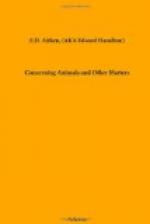Tommy was born in “the second city of the British Empire,” to wit, Bombay, in the month of March, 1901. His birthplace was a hole in an old “Coral” tree. Domestic life in that hole was not conducted with regularity. Meals were at uncertain hours and uncertain also in their quantity and quality. The parents were hunters and were absent for long periods, and though there was incredible shouting and laughter when they returned, they came at such irregular times that we did not suspect that they were permanent residents and had a family. One night, however, Tommy, being precocious and, as we discovered afterwards, keen on seeing life, took advantage of parental absence to clamber to the entrance of the nursery and, losing his balance, toppled over into the garden. He kept cool, however, and tried to conceal himself, but Hurree the malee, watering the plants early in the morning, spied him lying with his face on the earth and brought him to us.
He seemed dead, but he was very much alive, as appeared when he was made to sit up and turned those wonderful eyes of his upon us. He was a droll little object at that time, nearly globular in form and covered with down, like a toy for children to play with. His head turned like a revolving lighthouse and flared those eyes upon you wherever you went, great luminous orbs, black-centred and gold-ringed and full of silent wonder, or, I should rather say, surprise. This never left him. To the last everything that presented itself to his gaze, though he had seen it a hundred times, seemed to fill him with fresh surprise. Nothing ever became familiar. What an enviable cast of mind! It must make the brightness of childhood perennial.
There was some discussion as to how Tommy should be fed, and we finally decided that one should try to open the small hooked beak, whose point could just be detected protruding from a nest of fluff, while another held a piece of raw meat ready to pop in. It did not look an easy job, but we had scarcely set about it when Tommy himself solved the difficulty by plucking the meat out of our fingers and swallowing it. This early intimation that, however absent he might look, he was “all there” was never belied, and there was no further difficulty about the feeding of him. When he saw us coming he always fell into the same ridiculous attitude, with his face in the dust, but we just picked him up and stood him on his proper end and showed him the meat and his bashfulness vanished at once.
After sunset he would get lively and begin calling for his mother in a strange husky voice. At this time we would let him out in the garden, watching him closely, for, if he thought he was alone, he would sneak away slyly, then make a run for liberty, hobbling along at a good rate with the aid of his wings, though he never attempted to fly as yet. When detected and overtaken, he fell on his face as before. One memorable day he found a hole in a stone wall




